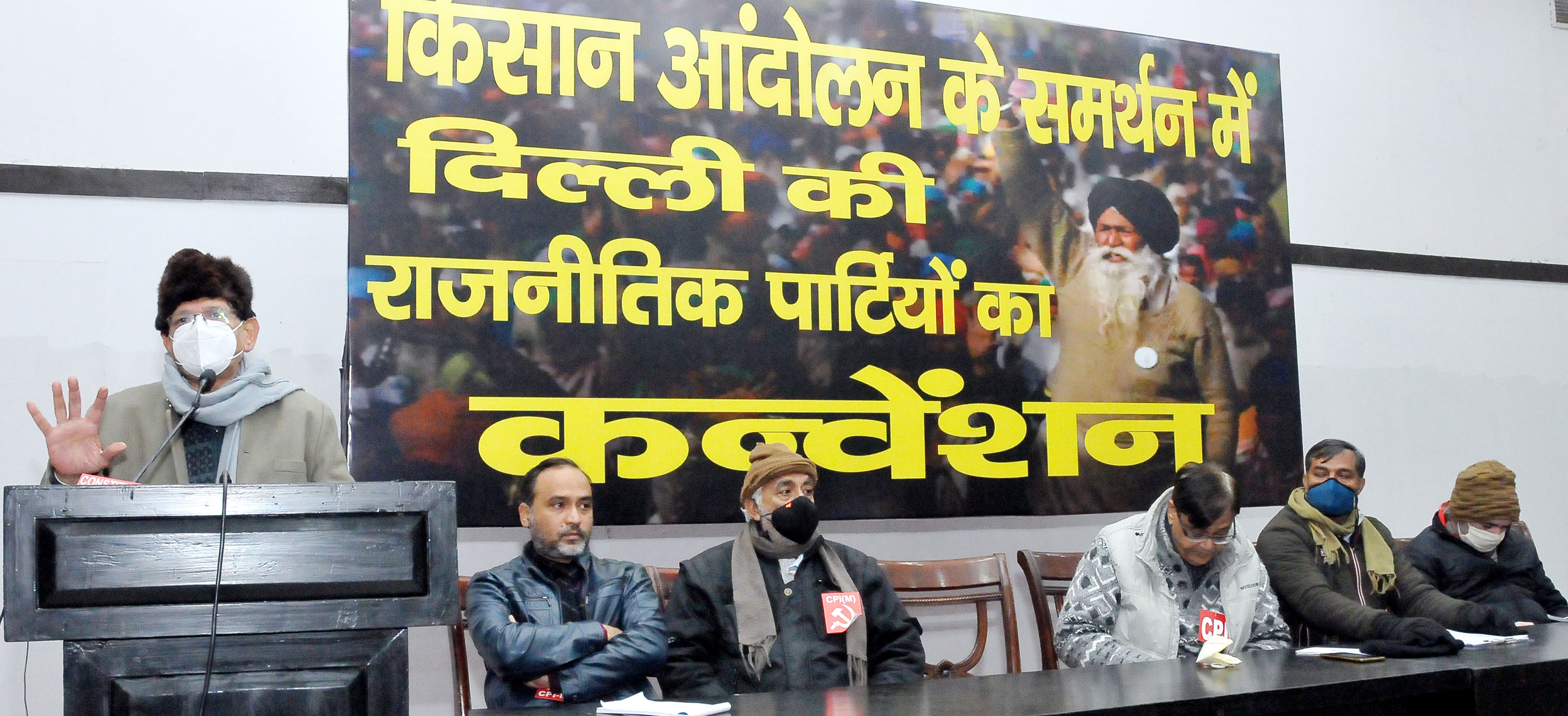
ON January 16, a convention by political parties in Delhi was held at Constitution Club (Annexe) in support of the 52-day farmer’s struggle at various venues along the Delhi border. The convention was presided by K M Tiwari from CPI(M), Dinesh Varshney (CPI), Ravi Rai (CPI-ML), Santosh Kumar (CGPI), Shatrujeet (RSP) and Gaurav (AIFB). Sitaram Yechury, Brinda Karat from CPI(M), K Narayana (CPI), Kavita Krishnan (CPI-ML), R S Dagar (RSP), Anita Rai Pawar (AIFB), and Prakash Rao (CGPI) spoke at the occasion. The convention adopted a resolution in solidarity with the struggle outlining clearly the points in the three farm laws opposed by the farmers in the country. It demanded the repeal of the laws and wanted guaranteed MSP and opening of procurement centres as recommended by the Swaminathan Commission. The resolution appealed to the people of Delhi to rally in support of kisans in the coming days.
DRAFT RESOLUTION IN SUPPORT OF FARMERS' MOVEMENT
The resolution was adopted in the convention and then sent to the prime minister with a firm resolve that the farm laws are repealed forthwith.
Contents of the resolution are placed below:
“We, representing our members, supporters and a wide range of public opinion, express our solidarity and support to the struggle of the kisans for the repeal of the three farm laws.
“Consider the manner of the passage of the Bills into laws without any consultation with kisans and their organisations to be an attack on the democratic rights of farmers to be consulted before any law is passed in their name. This reflects the authoritarian nature of the central government.
“Hold that the laws are an encroachment into the rights and jurisdiction of the states since agriculture and related issues are in the State List under the Seventh Schedule. This shows a most harmful push of centralisation of power in the hands of the central government against constitutional provisions.”
The resolution explained the three farm laws and held that these are not only against the interests of farmers but against the interests of every citizen of India.
1. The AMPC related Act is to favour big agribusinesses to directly enter the agricultural market through several concessions granted to them which will lead to their domination and a consequent weakening of the regulated markets where grain is procured at least at the minimum support price. It will lead to a reduction in foodgrains procurement which will adversely affect the public distribution system. Not only will kisans suffer, but the mass of people dependent on the rationing system will also suffer. The aim of the government to help corporates like Adani and Ambani and their global counterparts is clear by its refusal to have a law to guarantee MSP in a private transaction.
2. The law related to contract farming in which the farmer is left to the mercy of agri-corporates since the government has refused to stand guarantor in the contract agreement. Shockingly the kisan has no legal redress if the contractor breaks or cheats on the agreement. This law without price guarantees will make the kisans more vulnerable to the company. In both these laws, without a minimum price, the economic distress of farmers will intensify. It is this, which forces farmers to sell their land which is their major asset.
3. The third law which permits huge stocks of agricultural commodities to be stocked is nothing but a law to legalise hoarding. Big companies can hold the grain or other stocked agricultural commodities such as potatoes or onions, create artificial scarcities and then profiteer on the high prices which will badly affect consumers.
The resolution also laid emphasis on the ongoing struggle and stated that it strongly protests against the continuing repression on farmers and also the constant vilification of the kisan protest by leaders of the BJP ruling party led by members of the union cabinet
The resolution demanded that the three laws are repealed and discussions started with farmers for a law to guarantee MSP and opening of procurement centres as recommended by the Swaminathan Commission
Finally, there was a pledge to support the appeal of kisans for the intensification of the struggle.


